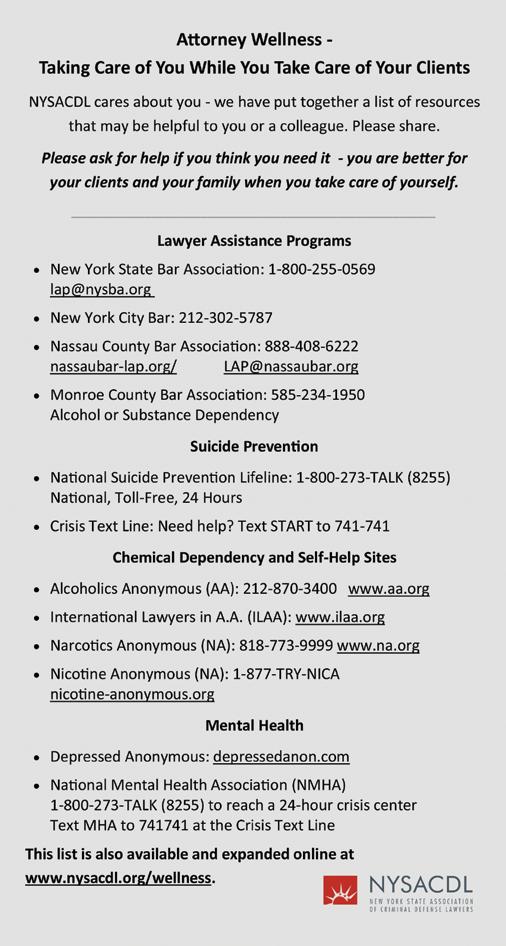
4 minute read
Amicus Curiae
by NYSACDL
NYSACDLmicus CuriaeA
Committee Update
Advertisement
By Richard Willstatter and Timothy P. Murphy,, Amicus Curiae Committee Co-Chairs
Richard D.
Willstatter is a criminal defense lawyer in Westchester County. a past-president of NYSACDL and a member of the Board of NACDL.
Timothy P.
Murphy, Esq. is an Assistant Federal Defender, WDNY, formerly chief appellate attorney for the Legal Aid Society of Buffalo, and a Vice-President of NYSACDL. In September, the NYSACDL Amicus Curiae Committee filed a letter/ brief in the New York State Court of Appeals in People v Nolis Ogando, APL 2020-00052. Our brief was authored by Rochester appellate attorney, David Abbatoy. The brief was joined by a number of amici: the New York State Defenders Association, the Chief Defender’s Association of New York, the Center for Appellate Litigation and the Monroe County Public Defender’s Office. The brief addressed the propriety of waivers of appeal, arguing that it was time for the Court to overrule the seminal appeal waiver decision, People v. Seaberg, 74 NY2d 1 (1989), where the Court first approved of courts utilizing appeal waivers. The Ogando case is being considered by the Court along with a number of other defendants’ cases from across the state in follow up to the Court’s recent decision in People v. Thomas, 34 NY3d 545 (2019), where three appeal waivers containing false information were considered.
NYSACDL also recently joined an amicus brief filed by Families Against Mandatory Minimums in the rehearing en banc of a Second Circuit panel’s decision, United States v. Scott, 954 F.3d 74 (2d Cir. 2020), finding that New York first-degree manslaughter is not a predicate crime of violence for purposes of the Armed Career Criminal Act (“ACCA”) or the Career Offender Sentencing Guideline because it can be committed by complete inaction and, therefore, without the use of force. The Panel decision was written by Circuit Judge Rosemary Pooler joined by Judge Leval with Judge Raggi dissenting. The government’s petition for rehearing was granted, so soon the en banc set of all active Second Circuit Court Judges will hear the case. Our brief was authored Continued on next page
The Amicus Curiae Committee can be contacted if you have, or learn of, a matter in which our participation is solicited. However, members are reminded to contact us as early as possible in the course of the case because it does take time to recruit an author, prepare, edit, print, copy and file a brief.
Continued from previous page
by Alan E. Schoenfeld of Wilmer Cutler Pickering Hale and Dorr LLP with substantial assistance from FAMM counsel Mary Price and Peter Goldberger of Ardmore, Pennsylvania. The amici argued that it would violate the “rule of lenity” to extend the ACCA’s or Guideline’s “force clause” to crimes of omission. In determining both the scope of a criminal statute and the penalties it authorizes, the rule of lenity requires that ambiguities “should be resolved in the defendant’s favor.” United States v. Davis, 139 S. Ct. 2319, 2333 (2019). NACDL joined a separate amicus brief in the same case filed by a variety of defenders, including the National Association of Public Defenders.
Finally, NYSACDL will file an amicus brief in the State Court of Appeals in the case of People v. Duval, 179 A.D.3d 62 (1st Dept. 2019). Hunter Haney of the Center for Appellate Litigation represents the appellant. He argued that reversal and suppression are required because a search warrant on its face did not give adequate constitutional notice of which particular separate apartment or unit in the house would be searched. The Appellant further argued that the motion court was not authorized to rely on materials not explicitly incorporated into the warrant to uphold its validity, based on the holding of Groh v. Ramirez, 540 U.S. 551 (2004), a position adopted by a dissenting justice of the Appellate Division. NYSACDL will be represented by Ada Wang and Iris Greenquist of White & Case LLP. We expect to file a brief by the end of October. Continued from page 9
for the year. Membership support plays a crucial role in NYSACDL’s success – both financially and in the power of the collective voice – and we are thankful for this milestone in such a challenging year. As renewals have begun processing for 2021, membership continues to look strong. Our Membership Committee continues to meet regularly to make sure we are serving the needs of our members, and enhancing our programs and services in response to the changing times.
Throughout the year, NYSACDL also worked steadfastly in other areas. The Legislative Committee navigated a challenging legislative session, the Amicus Committee continued to produce important briefs on cases in the courts today, and initiatives like the Trial Penalty Project Committee moved forward.
While we are looking forward to celebrating again, although socially distanced via Zoom, at our Annual Meeting on January 28th, the Board of Directors and I do not take for granted all we have accomplished in 2020. There are many who struggled throughout the year, and our focus continues to be how we can play a role in assisting our members, their colleagues, and clients. As always, thank you for your continued support of NYSACDL. Please reach out to me if there is anything you need or any ideas you may have. Be well.






